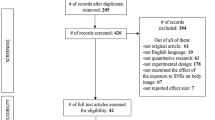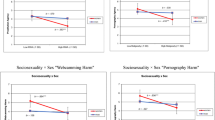Abstract
The well-established notion that the frequency of self-interested unethical behavior increases among anonymous people was reexamined employing a more strict definition of anonymity, voluntary unethical behavior, and adult individuals. Anonymity was defined as nonassociability of the participant’s traits with respect to unethical behavior. The participant’s identity and a monetary reward were manipulated as the independent variables, while cheating behavior was observed as the dependent variable. A sample of 143 undergraduate students were randomly assigned to 1 of 4 conditions (nonidentifiable-reward, identifiable-reward, nonidentifiable-nonreward, or identifiable-nonreward condition) to flip a coin twice in the experimental assignment. Results indicated that participants behaved differently depending on anonymity status and reward status. Implications for unethical behavior among anonymous individuals are discussed.
Similar content being viewed by others
References
ASCH, S. E. (1955). Opinions and social pressure. Scientific American, 193, 31–35.
BANDURA, A., & WALTERS, R. H. (1963). Social learning and personality development. New York: Holt.
BERSOFF, D. (1999). Why good people sometimes do bad things: Motivated reasoning and unethical behavior. Personality and Social Psychology Bulletin, 25, 28–39.
CARVER, H. S. (1974). Facilitation of physical aggression through objective self-awareness. Journal of Experimental Social Psychology, 10, 365–370.
DE CREMER, D., & BAKKER, M. (2003). Accountability and cooperation in social dilemmas: The influence of others’ reputational concerns. Current Psychology, 22, 155–163.
DIENER, E., FRASER, S. C., BEAMAN, A. L., & KELEM, R. T. (1976). Effects of deindividuation variables on stealing among Halloween trick-or-treaters. Journal of Personality and Social Psychology, 35, 178–183.
DIENER, E., & WALLBON, M. (1976). Effects of self-awareness on antinormative behavior. Journal of Research in Personality, 10, 107–111.
DUVAL, T. S., & WICKLUND, R. A. (1972). A theory of objective self-awareness. New York: Academic.
ECKEL, C. C., & GROSSMAN, P. J. (1996). Altruism in anonymous dictator games. Games and Economic Behavior, 16, 181–191.
FREY, B. S., & MEIER, S. (2004). Pro-social behavior in a natural setting. Journal of Economic Behavior and Organization, 54, 65–88.
FOX, J., & GUYER, M. (1978). “Public” choice and cooperation in n-person prisoner’s dilemma. Journal of Conflict Resolution, 22, 469–481.
GROVER, S. L., & HUI, C. (1994). The influence of role conflict and self-interest on lying in organizations. Journal of Business Ethics, 13, 295–303.
HARAOKA, K. (1990). Attitude and value: Orientation toward money attitude structure and composition of an attitude scale. [Okane ni taisuru taido to kachisikou I: Taido no kouzou to taidoshakudo no kousei]. Bulletin of the Faculty of Education, Nagoya University (Educational Psychology), Japan, 37, 199–216.
HEGARTY, W. H., & SIMS, Jr., H. P. (1978). Some determinants of unethical decision behavior: An experiment. Journal of Applied Psychology, 63, 451–457.
HOFFMAN, E., MCCABE, K., SHACHAT, K., & SMITH, V. (1994). Preference, property rights and anonymity in bargaining games. Games and Economic Behavior, 7, 346–380.
JOHANNESSON, M., & PERSSON, B. (2000). Non-reciprocal altruism in dictator games. Economics Letters, 69, 137–142.
KERR, N. L. (1999). Anonymity and social control in social dilemmas. In M. Foddy, M. Smithson, S. Schneider, & M. Hogg (Eds.), Resolving social dilemmas (pp. 103–119). Philadelphia: Psychology Press.
KOLLOCK, P. (1998). Social dilemmas: The anatomy of cooperation. Annual Review of Sociology, 24, 183–214.
KUGIHARA, N. (2001). Effects of aggressive behaviour and group size on collective escape in an emergency: A test between a social identity model and deindividuation theory. British Journal of Social Psychology, 40, 575–598.
LOE, T. W., FERRELL, L., & MANSFIELD, P. (2000). A review of empirical studies assessing ethical decision making in business. Journal of Business Ethics, 25, 185–204.
MATHES, E. W., & GUEST, T. A. (1976). Anonymity and group antisocial behavior. The Journal of Social Psychology, 100, 257–262.
MEIER, B. P., & HINSZ, V. B. (2004). A comparison of human aggression committed by groups and individuals: An interindividual-intergroup discontinuity. Journal of Experimental Social Psychology, 40, 551–559.
MOFFITT, T. E., CASPI, A., RUTTER, M., & SILVA, P. A. (2001). Sex differences in antisocial behaviour: Conduct disorder, delinquency, and violence in the Dunedin longitudinal study. Cambridge: Cambridge University Press.
POSTMES, T., & SPEARS, R. (1998). Deindividuation and antinormative behavior: A meta-analysis. Psychological Bulletin, 123, 238–259.
SCHEIER, M. F., FENIGSTEIN, A., & BUSS, A. H. (1974). Self-awareness and physical aggression. Journal of Experimental Social Psychology, 10, 264–273.
SILKE, A. (2003). Deindividuation, anonymity, and violence: Findings from Northern Ireland. The Journal of Social Psychology, 143, 493–499.
SPIVEY, C. B., & PRENTICE-DUNN, S. (1990). Assessing the directionality of deindividuated behavior: Effects of deindividuation, modeling, and private self-consciousness on aggressive and prosocial responses. Basic and Applied Social Psychology, 11, 387–403.
TSUJIOKA, Y., & MURAYAMA, S. (1975). Six dimensions of value judgment [Kachikan no rokujigen]. Proceedings of the Department of Sociology, Kansai University, Japan, 7, 161–174.
WALLACE, K. A. (1999) Anonymity. Ethics and Information Technology, 1, 21–31.
WHITE, M. J. (1977). Counternormative behavior as influenced by deindividuating conditions and reference group salience. The Journal of Social Psychology, 103, 75–90.
ZIMBARDO, P. G. (1969) The human choice: Individuation, reason, and order versus deindividuation, impulse, and chaos. In W. J. Arnold & D. Levine (Eds.), Nebraska Symposium on Motivation (pp. 237–307). Lincoln, Ne: University of Nebraska Press.
ZIMBARDO, P. G. (2004). A situationist perspective on the psychology of evil: Understanding how good people are transformed into perpetrators. In A. G. Miller (Ed.), The social psychology of good and evil: Understanding our capacity for kindness and cruelty (pp. 21–50). New York: Guilford Press.
Author information
Authors and Affiliations
Corresponding author
Additional information
This study is based on portions of Tatsuya Nogami’s master’s thesis. Big thanks go to Jiro Takai, Masayuki Kurokawa, Marisna Yulianti, and Koichiro Ito for their advice and comments on the study and earlier versions of the manuscript.
Rights and permissions
About this article
Cite this article
Nogami, T. Reexamination of the Association Between Anonymity and Self-Interested Unethical Behavior in Adults. Psychol Rec 59, 259–272 (2009). https://doi.org/10.1007/BF03395662
Published:
Issue Date:
DOI: https://doi.org/10.1007/BF03395662




